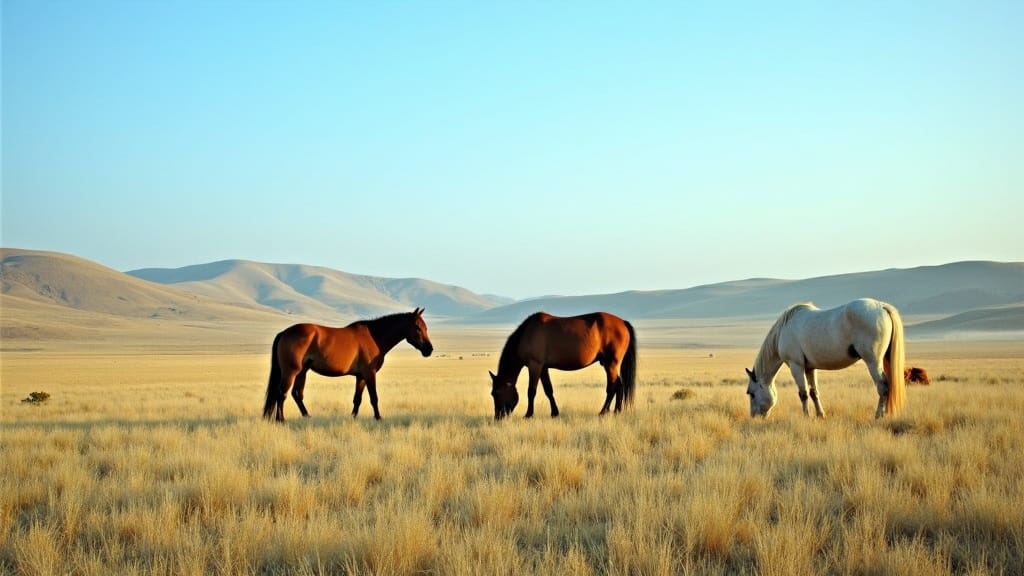Traveling With Horses? A Stress-Free Journey
Traveling with horses can be a rewarding yet challenging experience. There is a unique bond between you and your horse on the road. This article explains how to make the trip comfortable for both you and your equine companion through proper preparations, essential equipment, route planning, and handy tips, along with clear do’s and don’ts to help you navigate every mile without unnecessary stress.

Essential Preparations for a Stress-Free Journey
The cornerstone of any successful trip with horses is thorough preparation. Before kickstarting a journey, it is wise to assess both your equipment and your horse’s readiness. Being prepared can help you avoid unexpected delays or last-minute stress.
Start with a health check. Visit your veterinarian to ensure your horse is fit for travel. Make sure vaccinations, deworming, and a complete wellness exam are up to date so that your horse won’t face health issues on the road. Also, carrying copies of your horse’s health records and registration documents can be very important, especially when crossing state lines or international borders.
It is equally important to pack a well-equipped travel kit. Include first aid supplies for both you and your horse, grooming kits, and extra feed. Simple items like water buckets or a portable water trough can help reduce stress on your horse by ensuring continuous hydration and comfort.
Prepare Your Horse and Equipment
Getting your horse ready for a trip means focusing on both physical conditioning and familiarization with the travel equipment. Horses are naturally sensitive to new environments and confined spaces like trailers. To ease the transition, try short practice trips with the trailer to help your horse relax and understand that the trailer is safe.
Inspect your trailer carefully. A secure and well-maintained trailer is vital for a safe journey. Look for issues such as loose latches, faulty brakes, or worn-out tires. Make sure the interior is comfortable by adding extra padding or even a favorite blanket that reminds your horse of home. Good ventilation and adjustable partitions in the trailer can also help keep your horse calm during long rides.
Keep this checklist in mind as you get ready for your trip:
- Health Check: Schedule a vet visit, update vaccinations, and have all health records in order.
- Trailer Maintenance: Make sure every part—from latches to tires and brakes—is in top condition.
- Practice Trips: Take short trips with your horse in the trailer to build familiarity and ease anxiety.
- Comfort Accessories: Bring along blankets, extra padding, and essential grooming tools to make the ride pleasant.
These steps build confidence for both you and your horse, setting up a trustworthy environment necessary for longer trips.
Plan Your Route and Rest Stops
Planning your route carefully is key to reducing stress on the road. Mapping out your travel in advance helps you avoid surprises and organize timely breaks for feeding, hydration, and rest.
When choosing a route, keep these factors in mind:
- Accessibility: Select roads that are less congested and safer for a slow, careful pace. Avoid busy highways that might startle your horse.
- Rest Areas: Identify spots along the way where you can safely unload your horse for short breaks, feeding sessions, or water stops. Rural areas and designated animal rest stops are ideal.
- Weather Conditions: Always check weather forecasts. Extreme temperatures or sudden storms could affect your schedule and your horse’s comfort, so be ready to adjust your plans.
It is also wise to have a backup plan in case you run into unexpected delays. Know where nearby stables or veterinary clinics are located so you can quickly address any issues. This level of preparedness not only protects your horse’s physical safety but also helps maintain your own calm throughout the trip.
Expert Tips and Tricks for a Smooth Journey
After you’ve covered the basics, consider these advanced tips to take up a notch in your travel experience. These insights come from years of experience and are designed to make both short trips and long hauls as smooth as possible.
Keep a Routine: Horses thrive on consistency. Stick to regular feeding, watering, and rest intervals. Recreate as much of your home schedule as possible to help your horse stay anchored and relaxed.
Pack Light, But Pack Right: Overloading or underloading the trailer can cause unnecessary stress. A balanced load that includes all essential supplies while leaving enough space in the trailer can make a huge difference. Make sure that feed and water are stored securely to prevent spills during transit.
Monitor Your Horse’s Behavior: Stay alert for signs of stress such as excessive sweating, reluctance to eat, or restless behavior. If you notice these signs, take a break and let your horse enjoy some fresh air until calm returns. Quick action can often stop minor issues from becoming more severe.
Stay Calm: Horses are very perceptive and tend to mirror your mood. If you feel stressed, pull over and take a few minutes to regain your composure. A calm traveler usually means a calm horse.
Here are a few extra tips to help you along the way:
- Plan Checkpoints: Make a list of rest stops where you can pause every few hours. Choose locations that offer some shelter so that you can quickly assess your horse’s condition.
- Bring a First Aid Kit: A well-stocked kit for both you and your horse is very important. Include essentials like bandages, antiseptics, and any needed medications.
- Arrange Some Entertainment: Long trips can become monotonous. Small comforts such as a favorite blanket or toy from home might help reduce your horse’s travel anxiety.
- Confirm Reservations: If planning overnight stays at stables or equestrian-friendly facilities, booking in advance can save time and reduce last-minute hassles.
Using these expert tips can transform your journey into a more enjoyable and structured adventure, making it easier to manage unexpected challenges and maintain a restful pace.
Do’s and Don’ts When Traveling With Horses
Clear guidelines can help simplify your travel routine. Below are some essential do’s and don’ts to ensure a safe and organized trip:
Do’s:
- Prepare Gradually: Introduce your horse to the trailer and take short trips well before any long-distance travel. A gradual approach helps ease the transition.
- Pack an Emergency Kit: Always have extra water, food, and basic veterinary supplies. Being ready for the unexpected makes handling problems easier.
- Watch the Weather: Adjust your plans if the weather looks extreme. It’s very important to avoid conditions that might stress your horse.
- Stick to a Routine: Regular feeding and resting schedules keep your horse comfortable and maintain a stress-free environment.
Don’ts:
- Don’t Overload the Trailer: Too many items can create cramped conditions that unsettle your horse. Ensure there is enough space for movement.
- Don’t Ignore Signs of Distress: Act immediately if your horse appears anxious or uncomfortable. Delaying action may lead to more serious issues.
- Don’t Skip Pre-Trip Checks: Even small issues with your trailer or your horse’s health can lead to bigger problems on the road.
- Don’t Change Routes Suddenly: Consistency is key. Sudden route modifications can add unnecessary stress to both you and your horse.
Following these guidelines can help you have a safe, organized, and enjoyable experience. The aim is to keep stress to a minimum for both you and your horse, ensuring that every mile is managed smoothly.
Frequently Asked Questions
Traveling with horses often brings up several common questions. Here are answers to some of the most frequently asked questions:
Question: How do I know if my horse is ready for long-distance travel?
Answer: A recent health check is the best indicator. If your horse handles short trips well and appears curious rather than fearful of the trailer, it may be ready for longer journeys. Gradually increase travel times to build stamina.
Question: What should I pack for my horse on a long trip?
Answer: Pack essentials like water, feed, a first aid kit, grooming supplies, and comfort items such as a favorite blanket. This helps keep your horse calm and healthy during travel.
Question: How do I handle unexpected delays or emergencies?
Answer: Always plan ahead by knowing the locations of nearby stables, veterinary clinics, and safe rest stops. A well-stocked emergency kit and a calm mindset will make it easier to manage any setbacks.
Question: Are different weather conditions safe for travel?
Answer: Weather plays a significant role in travel safety. Avoid extreme conditions like heavy rain or very high temperatures. Check the forecast beforehand and adjust your plans if necessary.
Conclusion
Traveling with your horse doesn’t have to be overwhelming. With a well-planned trip that includes regular checks, gradual introductions to travel conditions, and routines that ensure comfort, you can make the experience both safe and enjoyable for you and your animal. By focusing on your horse’s health, equipment readiness, and careful route planning, you build a solid foundation for a calm and rewarding adventure.
Remember, every trip brings opportunities to stumble upon little hacks that work best for you. Whether it means pacing the trip carefully, maintaining a relaxed environment, or checking every detail along the way, the goal is to create a stress-free travel experience.
This guide has outlined essential preparations, proper equipment checks, thoughtful route planning, and focused tips as key elements in transforming your travel routine. It isn’t just about the destination. It’s about enjoying each mile and the unique bond that strengthens between you and your horse. Safe travels, and may your adventures always be filled with smooth roads, open spaces, and the reliable companionship of your horse!
Traveling with horses on Amazon
Enjoy your equestrian journey! 🏇
Build Your Online Business
and Learn Affiliate Marketing
See you there!
Our Unique Value Propositions
Discover why Chwals GPT is the top choice for equestrians looking
to build their online presence (register for free)
Tailored Equestrian Expertise – Community Connection – Intuitive User Experience



